Former Navy intelligence analyst Jonathan Jay Pollard delivered over 800 highly classified documents to the Israeli government over a 17-month period. According to an article by Seymour Hersh published in the New Yorker, Pollard stole and sold militarily sensitive Signals Intelligence information, a year's worth of memos by intelligence officers in the U.S. Navy's Sixth Fleet recording their observations of Soviet planes, ships, and submarines in the Mediterranean Sea, documents on how Navy intelligence was tracking Soviet submarines, and material revealing the capabilities of one of America's most highly classified photo-reconnaissance satellites. In a 1998 op-ed published in the Washington Post, four former directors of naval intelligence noted that Pollard "offered classified information to three other countries before working for the Israelis and that he offered his services to a fourth country while he was spying for Israel."
FBI agents arrested Pollard in Washington on Nov. 21, 1985 after he sought political asylum at the Israeli Embassy in Washington. He pleaded guilty to leaking classified documents and was sentenced to life imprisonment in 1987 with a mandatory-parole clause after 30 years. He was released November 20, 2015.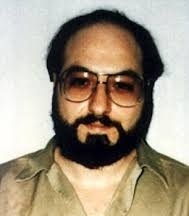
This moment was compiled from interviews by ADST with Thomas Pickering (interviewed beginning April 2003), Ambassador to Israel from 1985 to 1988,. Samuel W. Lewis (August 1998), who served as Ambassador to Israel from 1977 to 1985, Joseph G. Sullivan (January 2009), Embassy Tel Aviv's deputy political counselor from 1984 to 1988, Roger Harrison (November 2001), Embassy Tel Aviv's political counselor 1985-1987, and Phillip C. Wilcox (April 1998), Deputy Assistant Secretary of Near East Affairs, 1984-1987. Read the entire Moment on ADST.org.. This post was edited by Erika Saunders and Gabby Mendy.
PICKERING: "The Pollard Affair" related to a young Jewish-American who worked in a civilian capacity for U.S. naval intelligence, who somewhere along the line developed contacts with the Israeli embassy and with a man who I happened to know -- in another period, in another time, after this fact -- as a very dynamic, very intelligent, very effective Israeli Air Force officer. (Pickering is seen at left.)
Over that period of time, he volunteered to provide them with information, based on a supposition that from what he knew and saw, we were not sharing with our Israeli ally all the things he believed in his own individual account we should have been. He was given some compensation for his help.
This is his story. And so he began to provide information and the Israelis set up a system to make Xerox copies of documents that he took home with him from Naval Intelligence and then later returned. You know there were large volumes of these and many of them highly sensitive. I forget exactly how this popped out, but at some point we became aware of the fact that he was doing this.
He panicked and tried to drive into the basement of the Israeli embassy to seek refuge, was turned away, came into the custody of American officials. He began to relate at least some of what he had been doing.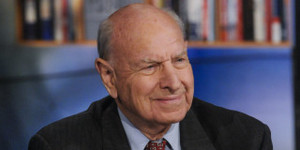
This opened up the entire situation. Then Joseph diGenova, who was the U.S. Attorney in the District, came to Israel with Abe Sofaer, the legal advisor to the Department of State, and others. We arranged for them to talk with a number of Israelis who were senior in the Israeli government as well as to some lawyers.
Among the most senior people they spoke with was the man who was then director of the Israeli internal intelligence service, the "Shin Bet" or the "Shabak" (Israeli counter intelligence and internal security services). They attempted to cooperate with us within the range of, I guess, some limitations they set for themselves.
They did provide us with information and returned a number of documents. Most of the documents they returned, as I recall, were below the level of top secret, so that things that maybe were talked about, highly incriminating for Pollard, would not have been returned. We asked for and got more documents.
In any event, on the basis of all this information, Mr. diGenova and another senior Department of Justice official with the prosecution proceeded and Mr. Pollard was convicted and sentenced to life. There has since been continuing pressure from Israel, and Americans as well, from time to time to seek his release.
There ... had been references in public from people like Seymour Hersh and others to the fact that Israelis were using some or all of the Pollard data for horse-trading in the intelligence sphere. I don't know whether anybody ever proved that, but people assumed it on the basis of standard intelligence practice.
I think probably the defense lawyers hoped to make some deal for better treatment. He did make a deal in talks for his wife (seen left) who was involved with him in this, who was not Jewish and was treated in a much gentler fashion by the prosecution.
It was also true that near the end of the case [Defense] Secretary [Caspar] Weinberger (seen left), who apparently felt very strongly about this obviously, issued a statement in which he was tough in his judgments about the damage that Mr. Pollard had done. Many people think that that played a significant role in the judge's final decision for a life sentence beyond what had been recommended...
Occasionally people come to me, perhaps not knowing what my status and role were at the time, and they asked me if I would join in the movement to free Mr. Pollard. I have always responded, "No, absolutely not." I have a very good idea of a lot of things that he did and I would not in any way at all want to be supportive of an effort to seek leniency. Subsequently, I slightly modified this view in public and said that if his release would contribute materially to Israel's joining in and agreeing to a two-state solution I could support the release, but only on that basis...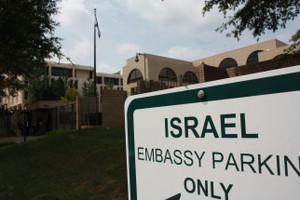
The Israelis played this as if it was something of a rogue operation, as if it had been created by a group with the Israeli initials "Lekem" which had been set up to collect scientific and technical intelligence. A former Mossad (intelligence) officer by the name of [Rafael] Rafi Eitan, as I remember, had been put in charge. He was reported to have allowed his enthusiasm for Mr. Pollard and his information to exceed the bounds of mutual respect between the United States and Israel...
[The Pollard Affair] slowed down [U.S.-Israel] cooperation for a while and focused the attention on this issue as opposed to other issues we were then dealing with. While it didn't last for a long period of time, it was one of those hiccups that take place in the U.S.-Israeli relationship.
LEWIS: I heard many times that while [James] Jim Angleton [Chief of CIA's Counter Intelligence, 1954-1975] was in charge of relationships with Israel's secret services during the 1950s, 1960s and early 1970s, there was a "gentleman's agreement" that neither side would recruit agents in each other's country. It may well be that that agreement was honored during that period. (Lewis is seen at right with Israeli Foreign Minister Moshe Dayan in 1977.)
But by the time I got to Israel in 1977, Jim Angleton had long since retired and the relationship between the American and the Israeli services was less close. In part, that may have stemmed from an internal CIA reorganization when the responsibility for that relationship was shifted from one man (Angleton) to a division (the Middle East). I know that throughout much of my tour in Israel, the U.S. was not observing any such agreement and I have no reason to believe that the Israelis were either.
When Pollard was finally detected, I was not too surprised that the Israelis had made efforts to recruit Americans for their intelligence collection efforts. What did surprise me was that Pollard had not been recruited by the Mossad, but by a small separate super-secret scientific intelligence agency, which originally had been established to coordinate information on nuclear matters, primarily from the US.
It operated right out of the Prime Minister's office. During my time, it was headed by an absolute jack-ass, who had previously been a Mossad agent and then was given the job of directing this scientific group. The Pollard operation was completely unprofessional, which came as a great surprise to me. It was the most unprofessional espionage case that I have encountered.
It became a terrible embarrassment to our relationships. Both Peres and Rabin were embarrassed; maybe even Shamir may have been, although he does not embarrass very easily. Peres was the Prime Minister when Pollard was exposed, although the operation had started during a Likud government. I believe it was started at Sharon's instigation.
Rafael Eitan, who was running this little office, was an ideological sidekick and a minor clone of Sharon. When Pollard was exposed, Sharon was still in the government, but was no longer the Defense Minister, although still very influential.
The whole Pollard case has been somewhat clouded by its handling by the American judicial system. I thought it was a dreadful stupidity on the part of the Israelis to run such a case, in light of all the support they receive from the US. They risked far more than they could ever benefit from it.
They were forced, through diplomatic channels, to cooperate to some degree with the American investigation, again violating all the rules of international intelligence operations, because if a government wants to recruit loyal spies, it does not then, in a crisis, cooperate with another government when it is trying to convict.
That sends the wrong signal to any other agents that may be operating in foreign countries. But that did happen. But the "gentleman's agreement" to which you referred had long been abandoned.
SULLIVAN: [Pollard] was arrested and the Israelis, of course, were intimately involved and at quite high levels. A senior Israeli intelligence figure had orchestrated the espionage and utilized as one of the people who made contacts with Pollard an Israeli air force hero of the bombing of the nuclear reactor in Baghdad. The Israelis clearly seduced Pollard with that and with money; he became an agent and delivered materials to the Israeli Government.
Now the period where the embassy got involved was after Pollard's arrest, when the Embassy and the U.S. pressed the Israelis to cooperate in the investigation and prosecution. The Israelis cooperated to a certain degree in identifying individuals who might have been involved, I think out of embarrassment and fear of its effect on relations with the US.
There was a team sent out that included State Department then Legal Adviser Abe Sofaer, Justice Department officials, and Joseph diGenova from the U.S. Attorney's Office prosecuting the case. We had a half a dozen meetings, typically starting at about 11:00 p.m. in Jerusalem. We would go through three or four hours in stages. They [Israelis] later brought out some of the individuals who had been involved and those individuals answered questions from our side. So there was some degree of cooperation.
Now in a situation like that, about how it had happened, what degree of involvement there was, the prosecution always wants more information. And I think at a certain point the Israelis decided they had provided enough and were not interested in cooperating any further. That may have already been after the first set of visits. I don't recall precisely, but it was a very tense period in the relationship.
The Secretary of Defense, Caspar Weinberger, was particularly upset, and it cost Israel a certain degree of collaboration from the U.S. for at least a period, until there was a decision made, notwithstanding this case, that it was in our interest to resume most levels of cooperation with Israel.
HARRISON: The Israelis were, because their economy was doing very poorly, were very eager to get that [military] aid level up [then at $3.2 billion] and because their weapon systems that they wanted then to purchase were increasing in price, so they would lobby to get their aid appropriation increased. 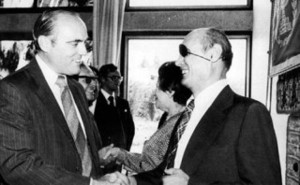
But at the same time the economy in our country, this was the first couple or three years of [the] Reagan [administration], was not doing well. Inflation and unemployment were up; budget deficits were skyrocketing, so the notion of increasing foreign aid -- never popular domestically -- would have been even less popular. By the way, I think the case that foreign aid, no matter for whom, is never popular domestically. Israelis don't get an exemption from that once it becomes a public issue.
An effort was made to keep it from becoming a public issue and yet increase it, and the idea was -- which I think was [U.S. Ambassador to Israel Thomas] Pickering's idea, he certainly promoted it -- was to index Israeli aid to inflation. Running about six percent or seven percent a year, by which Israeli aid would go up every year by whatever inflation index I guess we measured our inflation by, denominated in dollars. [That] would have meant, over the 15 intervening years, probably doubling that aid request.
Pickering was working on the Finance Committee on the Senate side, which was a firm supporter of Israel. But what scuppered that idea was Pollard -- in driving up to the driveway of the Israeli Embassy -- Jonathan Pollard, naval intelligence analyst, who in fact was being run by Israeli intelligence and had, I guess, transferred truckloads of classified information.
This goes back to an old dispute with Israel about how much intelligence we were willing to make available to them. They always felt that we were being too restrictive on intelligence. Pollard was about to be arrested, got wind of that and packed his wife in the car and went over to the Israeli Embassy seeking asylum.
Well, the Israelis were not about to bite. Eventually the Secret Service came and collected him from the Israeli Embassy and he was put in jail where he remains, thank God, to this day. There was much speculation Clinton might be provoked to pardon him...
The intelligence community has always been extremely opposed to that. When Mark Rich was a relatively uncontroversial pardon compared to what Pollard would have been, at least among the professional intelligence community... [President Bill Clinton pardoned international fugitive Marc Rich in January 2001.]
Anyway, what Pollard pretty much scuppered was that inflation index idea, because the Israelis were in high odor there for a while. It cost them a lot of money.
WILCOX: Pollard was an analyst at the Defense Naval Intelligence Agency who stole sensitive documents and passed them to Israel. He was a troubled, vulnerable young man who was very enthusiastic about Israel. Recognizing his vulnerability, the Israelis recruited him. It was an inept operation, and Pollard was discovered and arrested.
This created considerable strain with Israel because of our expectation we were friends and allies. We saw the affair as a breach of trust and told the government of Israel. Secretary George Shultz, who had done much to help Israel and strengthen relations, was livid, especially since the government of Israel lied about their involvement with Pollard, notwithstanding the clarity of the evidence. Pollard pleaded guilty, and was sentenced to life in prison.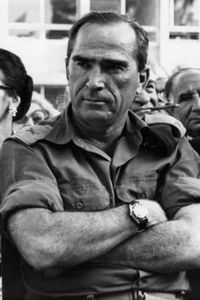
I worked very closely with the U.S. attorney, Joe DiGenova, at the time, with Abe Sofaer, the Legal Advisor at State, and the FBI. Pollard compounded his problem after his conviction by holding long interviews with Wolf Blitzer, who at that time worked for theJerusalem Post.
In these prison interviews, Pollard revealed more classified information. I think that may have influenced the judge's decision to give Pollard life, whereas other convicted spies had sometimes received lesser sentences. The government of Israel has since implicitly acknowledged its responsibility for Pollard, by seeking his release.
There was a firm and uniform view that Pollard should be dealt with by our judicial system and if found guilty, dealt with severely, as all spies and traitors should be. There was no effort in NEA [State Department Bureau of Near Eastern Affairs] to trim or compensate because of the impact of Pollard's crime on U.S.-Israeli relations. It caused real strain in the relationship. There were also cases of suspected misuse or diversion of military technology by the government of Israel in violation of our agreements that also caused recurrent friction in our relationship.
There was never clear evidence that Israel had stolen our technology and passed it on to other governments, but the government of Israel maintains a very large high tech arms industry. They are very good at studying foreign technology and adapting it for their own uses. Because of the investment we make in our own technology, we prohibit transfer of U.S. technology to third countries to whom we export arms.
The Israelis have cut some corners in this respect over the years. To my knowledge, Pollard's espionage was directed primarily at obtaining sensitive intelligence concerning Arab military capabilities. We were also concerned that these documents compromised intelligence sources and methods.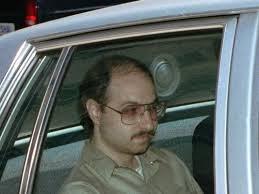
...The Israelis initially denied the accusation that Pollard was their agent. They ultimately acknowledged that he had handed over large numbers of documents to them, and there was a certain amount of cooperation with respect to the nature of that material and its return we requested.
An FBI mission went to Israel for further consultation with their lawyers and intelligence officials. But that process was grudging and incomplete. The Israelis were careful both to avoid acknowledgment that Pollard was their agent, and they wanted to avoid providing evidence that would have further harmed Pollard.
